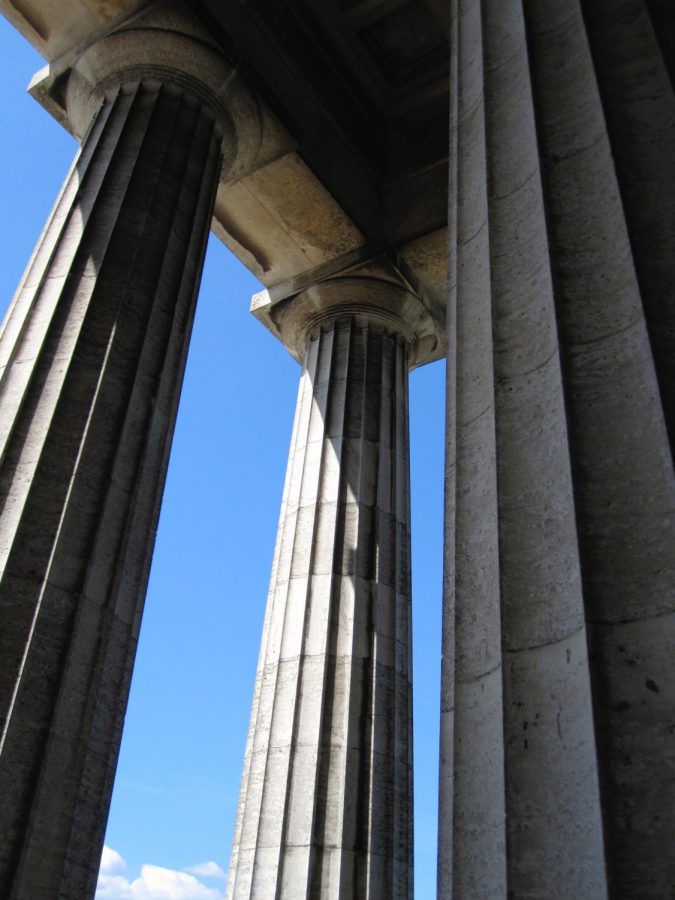Every country has a certain degree of nationalism. While this is more visible in some countries than in others, it can be a major motivating force for self-improvement. Improvements in military, technology, economy, and sports may occur in comparison to that country’s past, as well as in relation to other countries as well. These attributes contribute to the perceived power of a country, which, in turn, brings vitality and greater nationalism. But, one might ask: What drives certain countries to be more nationalistic than others?
To answer this, it helps to look at a few examples. The most obvious one is World War II Germany under the Third Reich. The Third Reich illustrates an extreme case of nationalism arising from economic desperation. This desperation not only made the population more willing to elect a radical leader who promised to fix all their problems, but also helped to increase the sense of community. Everyone was in the same boat and it was clear that it was easier to rebuild an economy with a shared sense of purpose and teamwork, rather than with sporadic attempts by multiple disparate parties, all with separate agendas. Desperation comes in other forms such as war and disease. In times of war, people put aside their differences to combat “evil,” although, when it is over (and, presumably they are not conquered or destroyed by genocide) they return to their usual squabbling. But then we arrive at disease, which has a way of tearing up a nation (unless there are specific people to blame), after which it takes a country to new heights. For reference, we can see that the Black Death, which killed roughly 20 million people in the late 1340s, brought about the Renaissance. Europe had hit rock bottom. There were not enough people to work; survivors witnessed horrors that changed their lives; and, people had lost pretty much all hope, even in divine intervention. However, divine intervention of sorts came in the form of uniting people to better themselves as a whole. This is an example of a worst-case, best-outcome scenario when examining the cause and effect of nationalism. European colonialism was a physical over-manifestation of nationalism, in other words, an example of going too far with nationalism.
The exception to the rule is that extreme instances of nationalism are caused by desperation. But what could cause this? As stated in the beginning, all countries have a certain degree of nationalism. This is natural; one roots for the home team. The best analogy for this is competitive sports. The local baseball team may not be in economic straits, have an invading force attacking, or a disease ravaging its players; but, they still want to play other teams and beat them, not only for bragging rights, but for more money and better player selection, all of which stand to increase the team’s power. People, for the most part, have an inherent need to feel powerful. While this lust for power sometimes manifests in evil dictators killing millions of people or greedy CEOs killing off thousands of jobs, for the average person, power must be collective. This is the idea behind unions: One person may not be able to get better wages (or attain a higher standing on the world stage), but many people with similar goals have the power to achieve much more. While in both countries and unions, this is easier to accomplish with homogeneity (otherwise tending to cause nationalism through discrimination of minorities), it is certainly possible in diverse countries like the United States.
Given these causes of nationalism, we can look at the dangers this institution poses to the very nation it is meant to elevate. While nationalism can have highly beneficial outcomes, such as the rebuilding of Germany after WWII (despite having a new culture of anti-nationalism), it can also have devastating and debilitating consequences. Nationalism to an extreme leads to a country believing itself fundamentally superior to every other country. This usually results in such a country increasing its sphere of influence (either by war or colonialism) with no regard for the people killed or displaced by its actions. In the modern day, support of such nationalism is generally frowned upon, although, at some point in time, many powerful countries have exhibited this behavior (United States, Russia, England, France, Spain, Portugal, Germany, Italy, Rome, Japan, China…). While this may be the most directly felt effect of extreme nationalism, it is not the most dangerous. That belongs to the effect of decay. After a time, nationalism has a way of becoming so ingrained in the culture of a country that it becomes the undisputed status quo in the minds of its people. In other words, the inhabitants of such a country have grown up believing their country is the greatest, and die thinking it is the greatest, but have never seen a need to improve either themselves or their country. Essentially it is the philosophy of not getting too cocky, lest one lose track of where they are in relation to other people, or even to their former selves. This happened to Rome, and the signs are starting to show here in our country. To what degree can be argued, but according to PBS only 58% of eligible voters cast a vote in the 2016 election. Does that indicate that the other 42% does not care? The fact is that we are not the greatest country just because we are, but that we are the greatest country because we improve ourselves. This was a reality during the Cold War, but we are losing that momentum. Among other examples, space exploration has been on a downward trend since the moon landings. If we, as a country, want to not only endure, but thrive, we must revitalize our sense of true nationalism, not to take over the world, but to make our country better.
However, in America, nationalism has a negative connotation, with patriotism being the dominant word choice when describing loyalty to one’s country. According to Merriam-Webster Dictionary, “In U.S. usage nationalism is now perhaps most frequently associated with white nationalism.” It also bears the negative connotation in its meaning of “loyalty and devotion to a nation especially : a sense of national consciousness exalting one nation above all others and placing primary emphasis on promotion of its culture and interests as opposed to those of other nations or supranational groups.” Given the tumultuous history of the word “nationalism,” it was surprising to hear the leader of the free world passing himself off as a “nationalist,” and even expressing regrets over its disuse at a rally in Houston on October 22, 2018. And, when looking at the President’s former remarks and actions, they do confirm that he stands a “nationalist.” For one, he often makes comments about America being first, and has begun to isolate the country on the world stage, displaying an air of superiority over the rest of the world. He also shows tendencies bordering on white nationalism, as seen in his remarks following the white nationalist march in Charlottesville, as well as spreading and subscribing to fears of Mexican/Central American immigrants and Muslims. To what degree the President is a white nationalist can be debated, but his actions and words combined speak much louder than his claim: “I am the least racist person you have ever met.” David Duke’s endorsement of the President does not detract from the assertion that he is a white nationalist.
The President has given ample evidence that he is a nationalist, however, it is what he has done with that nationalist mindset that causes the most worries. He has aroused a sense of nationalism in a large portion of the American public on extreme levels. We find that the cause is desperation, the likes of which one would expect to find in the Great Depression. The nationalism found in supporters of the President is a blend of this artificial desperation during a period of economic growth and relative prosperity, and feelings of pent up hatred and superiority which have no basis in reality. Mexicans are not all rapists, and not all Muslims are loyal to ISIS. The invasion of the Caravan and other false portrayals of these groups threaten the American way of life. Susceptible Americans begin to bubble over with nationalism of all types. Those who subscribe to such falsehoods and nationalistic beliefs may feel disenfranchised, while to the rest of the country, this appears to be overly dramatic. In many parts of the country, educational and economic systems have left people behind. In effect, America has already begun to spiral down the dangerous slope of nationalism. Based on our presumed victory in the Cold War, we have essentially declared ourselves and our beliefs superior to all others no matter what. While America has continued to improve itself overall, many supporters of the President believe in the unquestionable superiority of our country while feeling the effects of lower purchasing power and disappearing jobs in outdated industries such as coal.
The type of nationalism leading to decay has now caused an artificially fueled version of nationalism associated with hatred and ethnic superiority. This has been accelerated by the President, but this disease has been festering much longer. For the long term survival of the nation, nationalism must take a back seat to patriotism, for patriotism is rooting for the success of our country, while nationalism roots for its unquestionable superiority. Nationalism will always be in our country, but if true patriots choose inaction, then democracy in our country is doomed. It does not take a revolution to take over a republic. It has happened before with the rise of Hitler and the Nazi party, and it can happen again. This is why nationalism, more than any other individual factor, is possibly the largest threat to our country . It is the root cause of our problems, and will cause our downfall if we are not vigilant.
















